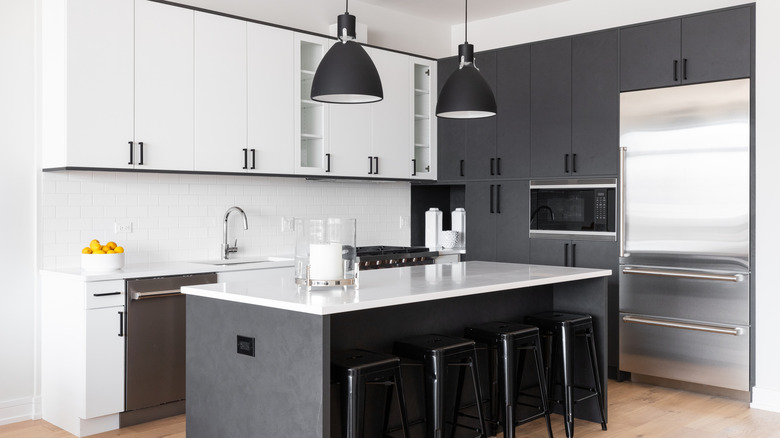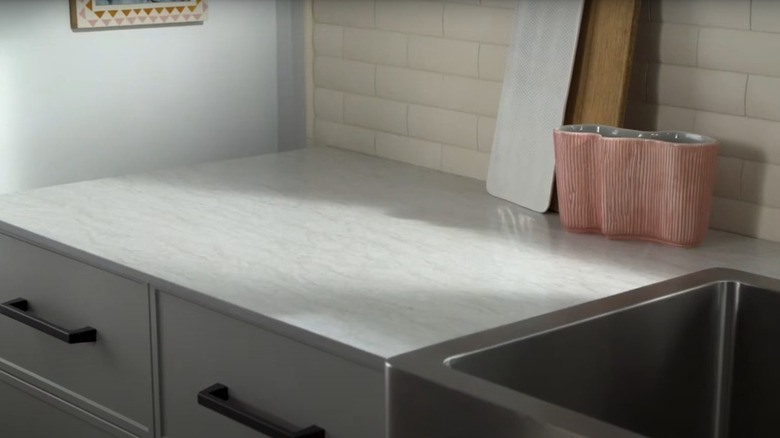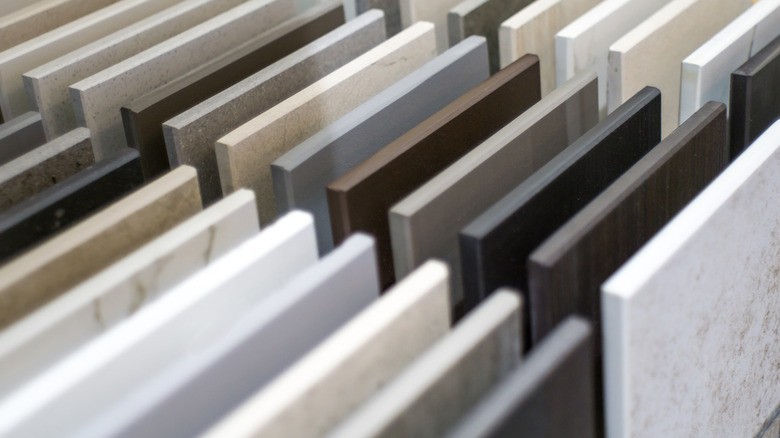Is Thinscape Countertop A Good Alternative To Quartz?
We may receive a commission on purchases made from links.
If you've recently been shopping for new kitchen countertops for your home, then you've most likely encountered surfaces that are made from quartz. This material is a popular choice when renovating thanks to its durability, timeless appeal, and minimal maintenance requirements. It's also man-made, which makes in incredibly versatile in terms of its visual appearance. However, there's one obvious downside of quartz that makes many homeowners think twice before buying it, and that's the cost. According to Home Depot, the average price for a quartz countertop is $80 per square foot, before adding edges. If you like the look of quartz, but the price tag is scaring you away from it, you might want to consider Thinscape instead.
Thinscape is a composite material from the Wilsonart brand that's made from a mixture of resin and paper. It can notably take on the appearance of quartz at a fraction of the original material's cost. As the name suggests, countertops that are made from Thinscape are relatively slim. This gives them a distinct visual flair that could definitely help modernize your interiors. And, although they might not look as thick as stone surfaces, they're actually reasonably durable. Ultimately, this makes them a solid budget alternative to quartz that could help you save money when renovating your kitchen. However, Thinscape countertops do have a couple downsides when compared with quartz that you'll want to know about before you purchase them. In some cases, quartz might be a better long-term investment for your space.
Key differences between quartz and Thinscape countertops
One of the primary advantages of quartz is how many different designs there are to pick from working with this material. You can find quartz countertops that mimic different kinds of natural stone, such as marble and granite. However, quartz can also take on bolder, brighter colors that create dramatic contrasts and more quickly catch the eye. Thinscape's color and style options are notably more limited, but they're still reasonably robust, especially if you want countertops that look like they're made from natural materials.
Thinscape products are all exactly ½ inch thick. If you want to install a countertop with a wider, more luxurious-looking edge, you'll have to work with quartz or another alternative material instead. The pre-set thickness of Thinscape counters can also be a problem if you're planning to keep your existing range during your remodeling project. The slimmer surface might not be tall enough to meet the edges of the fixture, and if that's the case, you'll have to increase the height of your cabinets to create a cohesive cooking space.
Another notable benefit of quartz is that it's slightly more durable than Thinscape. Although both products hold up well against liquid spills and stains, Thinscape is often more prone to scratching. However, it instead offers homeowners much easier installation than quartz. Quartz is an exceptionally heavy material; you'll likely need professional assistance when cutting and moving it. Thinscape, meanwhile, is a material you can cut at home with a circular saw.
Selecting the right countertop material for your space
Determining whether Thinscape or quartz countertops are a better fit for your home can be a tricky process. To make the right decision, there are a couple key factors to consider. The first is your budget. When you're estimating the cost of your new countertops, don't forget to factor in the price of applying your preferred edge profile. The most common countertop edge styles are usually relatively affordable, but if you want to make things look more ornately detailed, you might end up paying significantly more. The next factor to consider is how well the ½-inch thickness of Thinscape will work with your cabinets, appliances, and backsplash tiles. Its slimmer design, though elegant and sleek, isn't necessarily a good fit for everyone's home.
Another factor to consider when making your decision is how roughly and how often you're going to use your countertops. If you're cooking and preparing food every night with utensils and dishes that have the potential to scratch up the countertop, for example, then the extra durability that you get with quartz might make it the better choice for your home. Finally, you'll also need to think about the long term implications of investing in quartz. Since the material is highly durable and tends to look timeless, it can actually add to the value of your home. If you end up deciding not to go with quartz, there are plenty of other countertop choices that are excellent for resale value.


